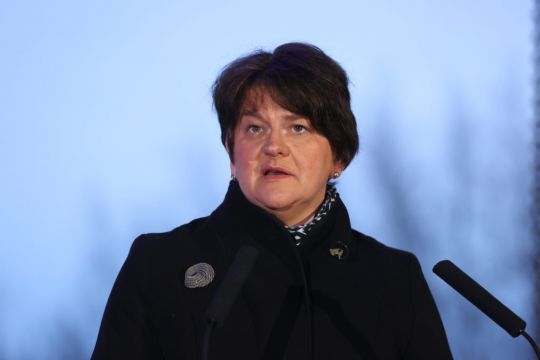Northern Ireland’s first minister has pressed British prime minister Boris Johnson to replace the NI Protocol after the EU sparked a dispute over vaccine controls.
The EU caused outrage on Friday evening when it invoked Article 16 of the post-Brexit mechanism, to stop the unimpeded flow of vaccines from the European bloc into the region.
Brussels subsequently reversed the move following condemnation from London, Dublin and Belfast.
Arlene Foster said it was an “absolutely incredible act of hostility towards those of us in Northern Ireland”.
“It’s absolutely disgraceful, and I have to say the prime minister now needs to act very quickly to deal with the real trade flows that are being disrupted between Great Britain and Northern Ireland,” she told BBC Radio 4’s Today programme on Saturday morning.
The DUP leader reiterated calls for Mr Johnson to enact Article 16 of the protocol over delays being face by hauliers.
“We’ve been asking the PM to deal with the flow problems and indeed, since January 1st, we’ve been trying to manage along with the government the many, many difficulties that have arisen between Great Britain and Northern Ireland and there are actions he could take immediately,” she said.
I’ve spoken with the Prime Minister @BorisJohnson and @michaelgove this evening. The Government must now take robust action including using Article 16 to advance Northern Ireland and the rest of the United Kingdom. pic.twitter.com/ugemDdll9z
Advertisement— Arlene Foster DBE PC #ProudofNI. (@ArleneFosterUK) January 29, 2021
“There is great unrest and great tension within the community here in Northern Ireland so this protocol that was meant to bring about peace and harmony in Northern Ireland is doing quite the reverse.
“The protocol is unworkable, let’s be very clear about that, and we need to see it replaced because otherwise there is going to be real difficulties here in Northern Ireland.”
Pressed on whether that would be in breach of an international treaty, she said: “Well it didn’t seem to bother the European Union yesterday when they breached the treaty in terms of their embarrassment around their vaccine procurement.”
Taoiseach furious
A former politician in Taoiseach Micheál Martin’s Fianna Fáil party said the Taoiseach was furious at the EU’s abandoned move to override part of the Brexit deal on Northern Ireland.
“The action doesn’t make any sense at all and it has clearly embarrassed the Irish Government which was blindsided,” former European minister Dick Roche said.
“I understand that Micheál Martin was very annoyed at it, that he made very strong representations to the Commission.”
In a statement late on Friday, the European Commission said it was “not triggering the safeguard clause” to ensure the protocol was “unaffected” after widespread condemnation of its move as part of its export controls on coronavirus vaccines.
The protocol has already proved unpopular with unionists in Northern Ireland who complain of a border down the Irish Sea.
On Friday, there were calls for UK government intervention amid claims that Brexit red tape could hinder the movement of military equipment within the UK.
Constructive talks with Prime Minister @BorisJohnson tonight.
We agreed on the principle that there should not be restrictions on the export of vaccines by companies where they are fulfilling contractual responsibilities.— Ursula von der Leyen (@vonderleyen) January 29, 2021
New Irish Sea shipping arrangements mean the armed forces need to give 15 days’ notice, complete customs declarations and even inform Nato in order to take materials from Great Britain to Northern Ireland, according to the Ulster Unionist Party.

UUP MLA Doug Beattie, a decorated Army veteran, said the restrictions were a consequence of the protocol, which governs the movement of goods across the Irish Sea since the Brexit transition period ended.
Mrs Foster said a restriction on the movement of military equipment was among “hundreds of problems” created by the protocol.
Under the terms of the protocol, Northern Ireland remains in the single market for goods and continues to apply EU customs rules at its ports and airports.







